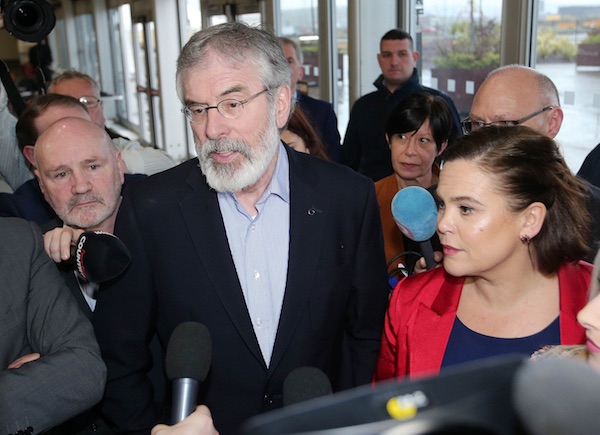
Sinn Fein leader Gerry Adams has said this week’s Assembly election would have a historic significance that would “resonate for years”. However, political parties and leaders now “have a job of work” to negotiate an agreement that delivers on the outstanding elements of all of the previous agreements.
Sinn Fein and the DUP now have only three weeks to form a new coalition executive, a step that would be eased considerably by a potential move by the scandal-plagued DUP leader, Arlene Foster, to quit.
“The future of the Good Friday Agreement, of the political institutions, and of the principles of equality and respect and parity of esteem that underpin the Agreement, are at grave risk,” Mr Adams said.
He said the DUP’s “operation fear” strategy had “boiled down to scaring the unionist electorate with Sinn Fein”.
“With Martin [McGuinness] so obviously ill, and Michelle (O’Neill) just new to the job, the DUP decided that this year I would make the perfect bogeyman,” he said.
“This election is about rights. The right of every citizen, whatever their religion, colour, gender, sexual orientation, to be treated as equals. The election is also about making a stand in favour of good governance.”
There was a warning from a veteran unionist that the North could be facing a prolonged state of limbo.
Emerging from his retirement earlier this week, the former DUP leader Peter Robinson who himself stepped down last year amid a separate series of corruption scandals, said Sinn Fein and the DUP should ensure there is space for an agreement “in the calmer times that follow the hustings”.
Mr Robinson insisted the RHI payments scandal, which has left Stormont with an ‘overspend’ of half a billion pounds, did not justify an election. He said he felt if Sinn Fein’s former Deputy First Minister Martin McGuinness had been in good health the problems for the DUP at Stormont would have been avoided. Instead, he argued, “more belligerent elements” in Sinn Fein had “seized their opportunity”.
The former First Minister also said he believes a major negotiation cannot be completed in the time legally available before a fresh election should be triggered. If the three week deadline passes, British Direct Ruler James Brokenshire is legally obliged to call yet another election. But, in those circumstances, the British government may well move to pass emergency legislation to suspend devolution.
“Almost inevitably, the assembly will be suspended and Northern Ireland will be back to Direct Rule,” Robinson said.
“As things stand the road ahead leads inexorably to stalemate. The election has pushed parties further apart and if over the next few weeks parties retain a list of red-line demands inflated by electoral enthusiasm it will be impossible to reach agreement in either the short or medium term.”
But addressing an election-eve event in west Belfast, senior Sinn Fein Assembly candidate Pat Sheehan vowed his party would not return to Stormont until agreements reached on the Irish language act, a bill of rights and legacy issues were delivered.
“There were three issues that have been agreed previously,” he said. “So you had the Irish language act, there was a thing called the bill of rights and there was another issue. An agreement to deal with the legacy of the conflict in regard to people who were killed during the conflict. We need to see those agreements implemented”.
When asked if it was a promise that his party would not return to government unless the agreements were implemented, Mr Sheehan replied: “Yes. Unless the outstanding agreements are implemented.”
SDLP leader Colum Eastwood said the “red lines” drawn by both the DUP and Sinn Fein were pointing to the long term collapse of devolution in the North.
“Two parties which refuse in absolute terms to compromise in government means that we will not have a government,” he said.
Meanwhile former US Senator George Mitchell, who helped negotiate the 1998 Good Friday Agreement, says it may be time to review the agreement’s structures.
In particular, Senator Mitchell suggested the north’s political parties should consider power-sharing by choice instead of the ‘mandatory coalition’ currently open to all the major Stormont parties, although abandoned by the UUP and the SDLP since last year.
“I think everyone anticipated that these arrangements were established to meet the problems and the needs of that time,” he said. “It is a normal part of the development of every society that over time institutions should be reviewed, processes should be reviewed.”
He also warned of the effect on the Good Friday Agreement of the British decision to leave the European Union.
“I believe that the European Union was an important factor that led the United Kingdom and Ireland to co-operate in establishing a process that led to the Good Friday Agreement and I think the UK being out of the European Union may reduce the prospect for further co-operation,” he said.
![[Irish Republican News]](https://republican-news.org/graphics/title_gifs/rn.gif)
![[Irish Republican News]](https://republican-news.org/graphics/title_gifs/harp.gif)

